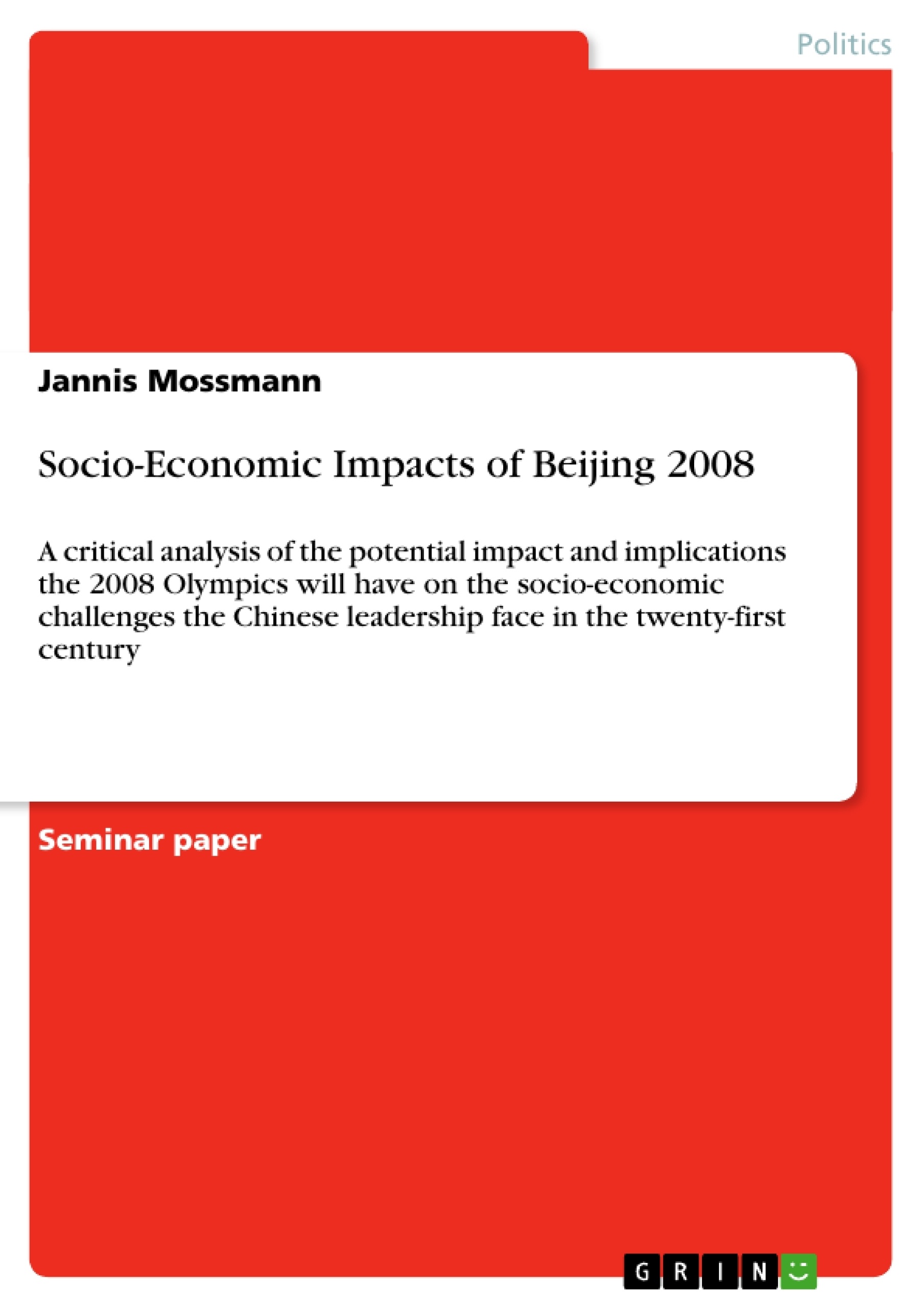The next Olympic Games in Beijing 2008 are a major interest of the Chinese leadership. By 2008, China aims to have spent $35 billion on the games (“Beijing’s Olympic”, 2007), dwarfing the $8.7 billion spent by Greece. The Economist (2007) has calculated that this amount makes up more than 43 percent of the total for all the games, including Beijing, since Montreal’s in 1976. The summer Olympics shall crown 30 years of successful economic reform. They will symbolize the outside world that China is on its way to reach world power status. The symbolic character to hold the world’s biggest event seems to overshadow other impacts such an event can have (Owen, 2005). But, Uu Jingmin, vice chairman of the Beijing 2008 organizing committee, believes that the Olympics will contribute not only to economic development, it will bring also social progress for the whole country (in Hua, 2004). The Organization committee has proclaimed three major topics: the People's Olympics, the High-Tech Olympics, and the Green Olympics (Hua, 2004). But, it is highly controversial, if mega events are at the end economically and social beneficial for a venue city or not. The output of Olympic Games is “incalculable, or, if calculable best considered as estimates only” (Hiller, 1998). At some points, the Olympics in Beijing can even lead to economic or social damage. To draw a conclusion about the whole range of impacts of global sports-events is difficult because of a lack of available data. Furthermore, China as a whole is still a developing country and faces massive socio-economic challenges. The impact of the Olympic Games will be small in regard to China’s general socio-economic challenges facing Chinese leadership in the twentyfirst century. A final conclusion, how useful the Olympic Games will be outside the arena, especially in the long term, can be only drawn, when the games are already over. Anyway, this work shall clarify which impacts the Olympic Summer Games can have on China’s social and economic challenges. Therefore, I split the essay in two parts. The first part will deal with economic impacts and implications resulting from Beijing’s successful bid for the Summer Games. The second part describes social aspects of the Summer Olympics in Beijing. I try to describe not only the impacts on the challenges for China. The Chinese capital as venue deserved attention as well.
Inhaltsverzeichnis (Table of Contents)
- Introduction
- Economic Impacts
- Infrastructure
- Employment
- Tourism
- Effects for Beijing and its Region
- Know-How and Foreign Investment
- Social Implications
- Environment
- Human Rights
- National Feeling
- Conclusion
Zielsetzung und Themenschwerpunkte (Objectives and Key Themes)
This essay examines the socio-economic impacts of the 2008 Olympics in Beijing on China's challenges in the 21st century. It analyzes the economic benefits and social implications of the Games, considering their impact on infrastructure, employment, tourism, the environment, human rights, and national sentiment. The essay focuses on both the potential benefits and potential drawbacks of hosting such a massive event, particularly for Beijing and its surrounding region. Key themes include:- The economic impacts of the Beijing 2008 Olympics, including infrastructure development, employment opportunities, and tourism growth.
- The social implications of the Games, including environmental concerns, human rights issues, and the potential for national pride and unity.
- The role of mega-events like the Olympics in influencing economic and social development, both in the short and long term.
- The complexities of assessing the impact of the Olympics, considering data limitations and the ongoing development of China.
- The challenges faced by China in the 21st century and how the Olympics might contribute to addressing them.
Zusammenfassung der Kapitel (Chapter Summaries)
- Introduction: The essay introduces the 2008 Olympic Games in Beijing as a significant event for China, highlighting the substantial investment made and the symbolic importance of hosting the Games. The essay also introduces the debate around the economic and social benefits of mega-events like the Olympics, acknowledging the complexities of assessing their impact.
- Economic Impacts: This chapter explores the economic benefits associated with hosting the Olympics, including infrastructure development, job creation, and tourism promotion. It also discusses the potential for attracting foreign investment and enhancing technological capabilities.
- Social Implications: This chapter examines the social impacts of the Olympics, including environmental concerns, human rights issues, and the potential for fostering national unity and pride. It acknowledges the potential for both positive and negative social consequences.
Schlüsselwörter (Keywords)
The essay centers around the socio-economic impacts of the 2008 Beijing Olympics on China's development. Key topics and concepts include infrastructure development, economic growth, employment opportunities, tourism promotion, environmental sustainability, human rights, national identity, and mega-events. The essay also focuses on the challenges faced by China in the 21st century and the potential for the Olympics to contribute to their resolution.- Arbeit zitieren
- Jannis Mossmann (Autor:in), 2007, Socio-Economic Impacts of Beijing 2008, München, GRIN Verlag, https://www.hausarbeiten.de/document/73257


